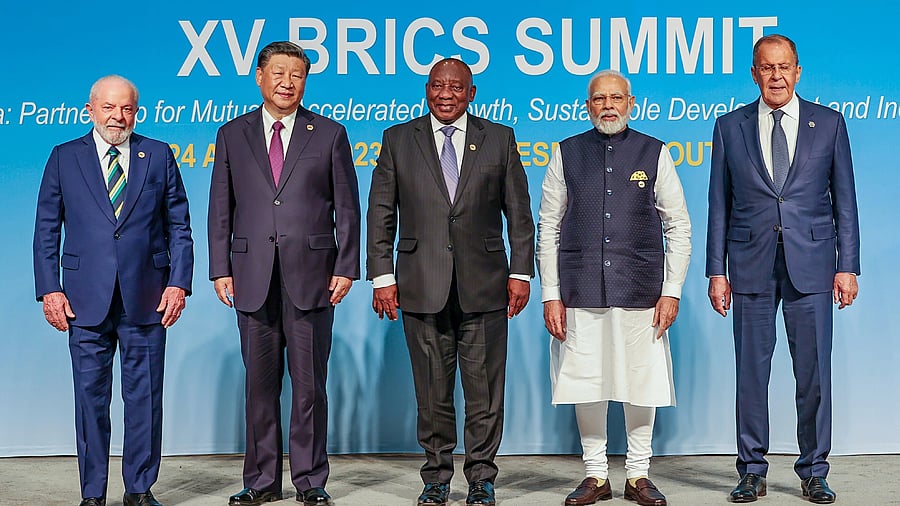
Prime Minister Narendra Modi with Brazilian President Luiz Inacio Lula da Silva, Chinese President Xi Jinping, South African President Cyril Ramaphosa and Russia's Foreign Minister Sergei Lavrov poses for a photo during the 2023 BRICS Leaders Retreat Meeting, in Johannesburg.
Credit: PTI Photo
With six new members — Ethiopia, Argentina, Egypt, Iran, Saudi Arabia, and the United Arab Emirates all set to join BRICS in January 2024 — BRICS has become a virtual alphabet soup, with the unenviable task of choosing for itself a pronounceable acronym.
Jokes apart, the fact that more than 20 countries had formally applied to join BRICS shows that the organisation still has resonance and relevance in current geopolitics. Countries clearly see merit in joining the grouping despite the Western narrative dismissing BRICS as a mere anti-Western platform, rife with rivalries within it.
With the addition of the new members, BRICS-11 will account for 37 per cent of global GDP in PPP terms, and 46 per cent of the global population.
The new members reflect global diversity and inclusivity. These are countries which have never had a clear say in framing the rules of global governance. Many of the new entrants have rivalries with existing or new BRICS members. For instance, in addition to the well-advertised rivalry between India and China, Argentina and Brazil do not see eye-to-eye on many issues, and there is a growing rift between Saudi Arabia and the UAE. This illustrates that BRICS is performing a key function of international organisations: serving as a neutral forum for discussions even among hostile countries for resolving disputes, preserving peace, and developing common goals for its members.
Reports suggest that India took the lead in forging a consensus on the criteria for membership and the selection of new members. It is, therefore, no wonder then that all the new members are New Delhi’s strategic partners, and reflect India’s current foreign policy priorities. Throughout its G-20 presidency, India has been championing the cause of Africa, and has even proposed that the African Union be made a part of the G-20.
Two African countries, Nigeria and Egypt, have been invited as guest countries for the G20 summit in September. This explains the inclusion of Ethiopia in BRICS. Four countries on the list are from the Middle East North African (MENA) region, a region of colossal importance to India. India has been pursuing its Look West policy, focussed on MENA, with greater vigour in recent times. The region is India’s largest source of fossil fuels, and is also home to a large Indian diaspora and, therefore, a source of large forex remittances. Earlier this year, India and Egypt signed an agreement on a strategic partnership and Egypt bestowed its highest honour of the land — the Order of the Nile — on Prime Minister Modi. Moreover, the inclusion of the MENA countries brings all the major producers of oil and gas and the largest consumers and importers of oil and gas — China, and India — together.
If the grouping can come together on de-dollarisation for financial transactions on fossil fuels, this could upend global geo-economics, geopolitics, and the world order as we know it. Given the attempt by Riyadh and Dubai to diversify their economies, their inclusion would bring new opportunities for investments, especially for India. Saudi Arabia and Egypt, despite being US allies, have been trying to develop more independent foreign policies; their admission into BRICS reflects this, and is also a warning to the US not to take them for granted. This will further weaken Washington’s influence in the region.
While some scholars argue that this round of expansion benefits China more than India because the new members all have strong trade ties with China, it is near impossible to find any country that does not fit that label. Indeed, China is the biggest trading partner of most countries, including the US!
The inclusion of so many countries, with all of whom India has deep and bourgeoning ties, will give India more flexibility within the group and allow India to build issue-based coalitions within the group which can stand up to China, if required. It will further promote deeper ties between India and the new members, enhancing India’s credibility, and allowing it to exert more leverage on the global stage. This will, of course, require deft and flexible diplomacy by India.
The expansion of BRICS, while amplifying the voice of the Global South, could become the steppingstone for another role which international organisations serve — generating rules — particularly if they all come on board with de-dollarisation and a BRICS-11 reserve currency. Then the leap from rule followers to rule creators would be complete for the grouping.
(Uma Purushothaman is Assistant Professor, Department of International Relations, Central University of Kerala.)
Disclaimer: The views expressed above are the author's own. They do not necessarily reflect the views of DH.